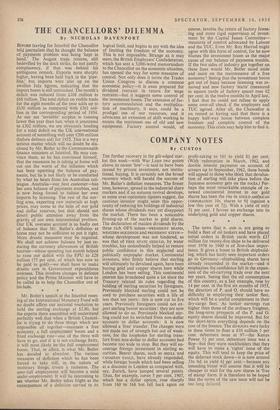THE CHANCELLORS' DILEMMA
By NICHOLAS
DAVENPORT
BEFORE' leaving for Istanbul the Chancellor told journalists that he thought the balance of payments problem was being 'kept in hand.' The August trade returns, still bedevilled by the dock strike, do not justify complacency, if that was behind his ambiguous remark. Exports were sharply higher, having been held back in the 'pipe- line,' but imports were also up on the swollen July figures, indicating that the import boom is still untouched. The month's deficit was reduced from £108 million to £68 million. The total deficit on visible trade for the eight months of the year adds up to £630 million as compared With £361 mil- lion in the corresponding period of 1954. As our net 'invisible' surplus is running lower this year than last, when it amounted to £302 million, we are obviously heading for a total deficit on the UK international account of something well over £200 million (before defence aid) for 1955. This is a very serious matter which will no doubt be dis- closed by Mr. Butler to the Commonwealth finance ministers at Istanbul. He may con- vince them, as he has convinced himself, that the measures he is taking at home will cut out the worst of the inflation which has been upsetting the balance of pay- ments, but he is not likely to be comforted by what he hears from his Australian col- league. Australia—our best customer—has her own balance of payments troubles, and is now being forced to reduce her own imports by licensing. The rest of the ster- ling area, exporting raw materials at high prices, may come to the help of our gold and dollar reserves, but that should not divert public attention away from the gravity of our own international problem. Our UK overseas account is so badly out of balance that Mr. Butler's deflation at home may not be sufficient to put it right. More drastic measures may be required. We shall• not achieve balance by just re- ducing the currency allowances of British tourists—whose spending last month helped to raise our deficit with the EAU to £28 million (75 per cent. of which has now to be paid in gold)—we shall have to make drastic cuts in Government expenditures overseas. This involves changes in defence policy and the Prime Minister will have to be called in to help the Chancellor out of his hole.
* * * Mr. Butler's speech at the Istanbul meet- ing of the International Monetary Fund will no doubt affirm our national resolution to hold the sterling exchange at $2.80, but the experts there assembled will understand perfectly well that when a British Chancel- lor is trying to do three things which are impossible all together—maintain a free economy, a full employment boom and a fixed exchange rate—one of the three will have to go, and if it is not exchange fixity, it will most likely be the full employment boom. That, in effect, is what Mr. Butler has decided to abandon. The various measures of deflation which he has been forced to take will, in the nature of monetary things, create a recession. The over-full employment will become a mild under-employment. It will be interesting to see whether Mr. Butler takes fright at the consequences of a deflation carried to its logical limit, and begins to toy with the idea of limiting the freedom of the economy. This is not impossible. Strange as it may seem, the British Employers' Confederation, which has sent a 5,000-word memorandum to the Chancellor on the economic situation, has opened the way for some measures of control. Not only does it invite the Trades Union Congress to discuss a common economic policy—it is even prepared for dividend restraint in return for wage restraint—but it suggests some control of the investment boom. The extension of fac- tory accommodation and the multiplica- tion of machinery, it says, could be a prodigal use of our resources, and it advocates an extension of shift working to ensure the maximum use of old and new equipment. Factory control would, of
course, involve the return of factory licens- ing and more rigid supervision of invest- ment by the Capital Issues Committee— measures of control advocated by Labour and the TUC. Even Mr. Roy Harrod might agree with this form of control, for he now blames the investment boom as the major cause of our balance of payments trouble. If the two sides of industry got together on these lines would Mr. Butler stand aside and insist on the maintenance of a free economy? Seeing that the investment boom got out of hand because licensing was re- moved and new factory 'starts' (measured in square yards of factory space) rose 62 per cent. in the twelve months to April last, I feel that he could not refuse to apply some over-all check if the employers and TUC agreed. After all, the Chancellor is on record as having said that there is a happy half-way house between complete freedom and complete control of the economy. This crisis may help him to find it.


































 Previous page
Previous page